There have been two significant developments in the Middle East over the past 24 hours.
1. The US and its allies launched military strikes against the Houthi militia in Yemen yesterday.
The airstrikes targeted Houthi sites used to launch missiles and drones, as well as radars and weapons depots, to prevent them from attacking ships in the Red Sea.
The Houthis have been launching attacks against shipping off the coast of Yemen since November in what they say is retaliation for Israel’s military actions against Hamas in Gaza. Military analysts said yesterday’s US-led strikes were in response to a large drone and missile attack launched by the Houthis on Tuesday evening.
Stay on top of your world from inside your inbox.
Subscribe for free today and receive way much more insights.
Trusted by 129,000+ subscribers
No spam. No noise. Unsubscribe any time.
Interestingly, Bahrain was the only Arab nation to participate in yesterday’s strikes. Neither Saudi Arabia nor the UAE – the two countries most targeted by the Houthis in recent years – were involved.
2. The Iranian military seized an oil tanker carrying Iraqi crude off Oman’s coast early yesterday morning.
Earlier on Thursday, masked gunmen boarded the tanker St Nikolas near the Omani port of Sohar and directed it to head towards an Iranian port.
The tanker had previously been seized by the US last April (it was named the Suez Rajan at the time) after it was found carrying 980,000 barrels of sanctioned Iranian oil. The oil was confiscated and later sold by Washington.
At the time, Iranian authorities vowed to respond in kind, and yesterday’s seizure seems to have made good on that promise.
Iranian state media said that the Iranian navy had boarded a “US oil tanker” (the vessel is, in fact, Greek-owned) in compliance with an Iranian court order that found the ship had “stolen an Iranian oil cargo and handed it over to the US.”
The United States has demanded the prompt release of the ship and its crew, saying Iran was actively trying to disrupt global trade.
INTRIGUE’S TAKE
😮💨 Phew, got all that? Let’s focus on the more consequential of the two (seemingly unrelated) incidents – the US-led air strikes.
Firstly, the strikes are unlikely to achieve their aim of deterring the Houthis – after all, eight years of brutal conflict with Saudi Arabia only seems to have emboldened them.
Secondly, destroying the Houthis’ capability to launch missiles and drones is no easy task. Take a look at this excellent 3D map of Yemen (the Houthis control the northwestern portion of the country, centred around the capital Sana’a).
That topography is nightmare fuel for any military strategist, let alone one planning a limited attack against a highly mobile, battle-hardened militia. And we must assume the Iranians will be only too happy to restock any damaged Houthi merchandise.
The US and its allies are now in a difficult position. They clearly felt they could no longer stand idly by while an Iranian-supported militia brought global shipping to its knees.
But, by striking the Houthis, they’ve implicitly locked themselves into an escalation spiral. If the Houthi attacks continue, the US and its allies will feel obliged to respond again. And if the Houthi attacks escalate… well, let’s cross that bridge when we come to it.
Also worth noting:
- The Houthis may have made a critical error – upsetting Elon Musk. Tesla’s German plant has been unable to get necessary parts due to shifts in shipping routes to avoid the Red Sea.
- A Houthi armed drone costs ~$20,000, while the advanced missiles used to shoot them down cost over $1.2M.
- Oil prices jumped nearly 2% on the news of the US-led strikes.









